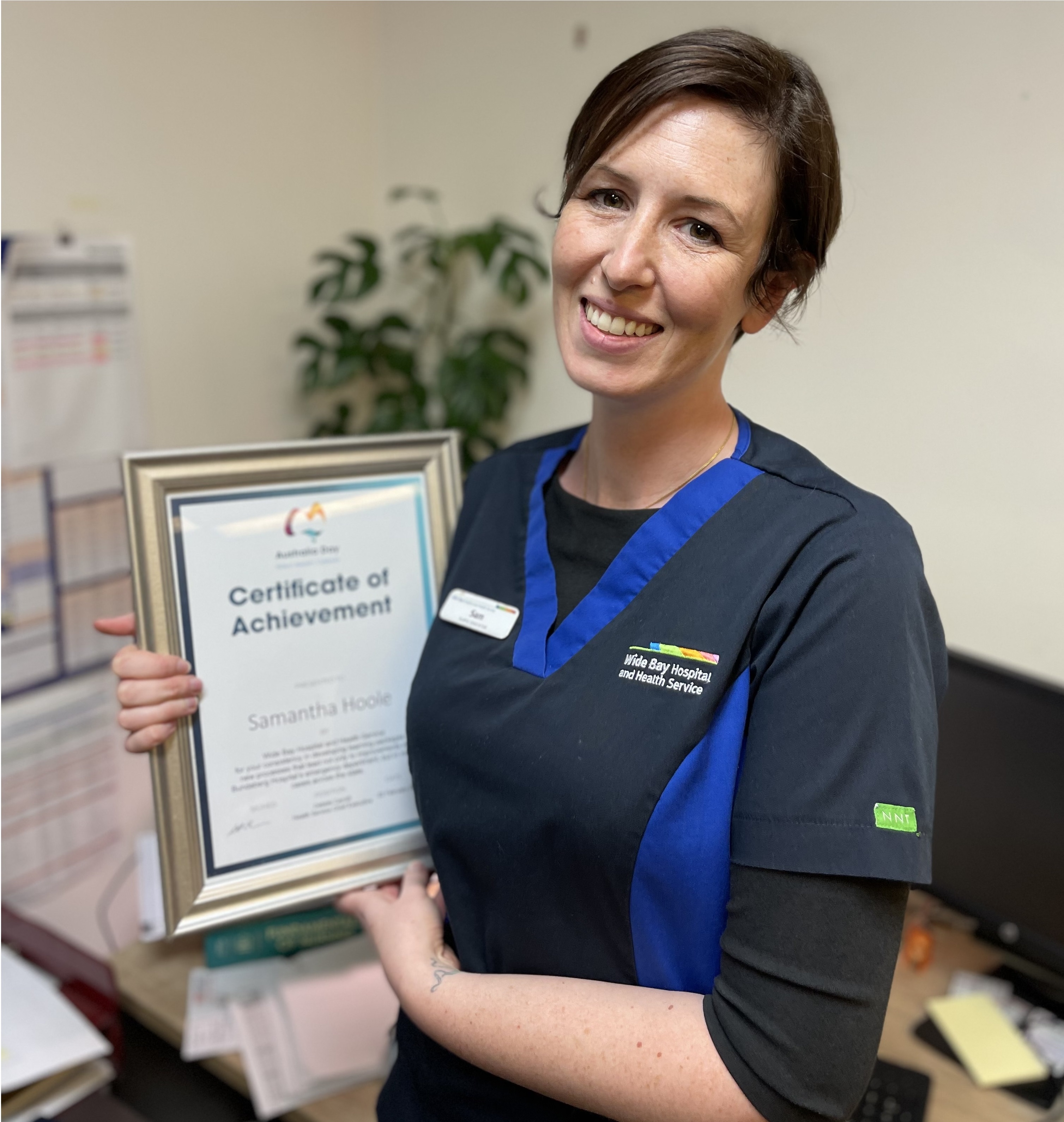When your nurse-to-nurse educator ratio is 170:1, your approach to education needs to be pretty novel. Thankfully for the emergency nurses in Wide Bay, Nurse Educator Samantha Hoole has it covered. As part of our continued celebration of Emergency Nurses Week, we heard from Samantha what working in a regional hospital is like.
Sam’s experience in emergency nursing began in 2011 at the Royal Brisbane and Women’s Hospital’s Emergency Department which offered a supportive transition program. “It was an organised program where you could go into different hospitals and be supported the whole way. I lost three kilograms in the first week from so much running around! But I fell in love with it and haven’t looked back,” Sam said.
Family reasons saw Sam return to Bundaberg Hospital before a move to Royal Darwin Hospital. In 2018 she was back in Bundy taking up the role of Nurse Educator in ED. “It’s a challenge; working in a regional setting compared to a tertiary hospital. You don’t have the same resources or specialties to draw from so the breadth of knowledge you need is huge. We are the only public hospital in Bundaberg, so you see everything. Nurses need to be trained in paediatrics, adults, and gerontology,” Sam said.
In the Wide Bay there is a higher burden of disease, and these public health issues – hypertension, diabetes, etc. – is creating more complex patients. “The acuity has increased – patients are sicker, older, and more complicated.”
And for Sam, the challenge is trying to support nurses to be able to manage these complexities without a myriad of resources. “I’ve had to be a bit different – I create videos on Teams and run afternoon in-services every day. We’re also trialling drop-in skills clinics where people can come in and just get hands on with something.”
“I try to meet people where they’re at and to be flexible. The skill mix is so different - from novices to nurses with 20+ years’ experience - so a strict structure doesn’t work,” Sam said. Sam’s commitment to supporting nurses in as many ways as possible saw the development of the Safer Ventilation in Emergency (SaVE) package to promote safe care of the ventilated patient in ED. The bedside resource assists with:
- bedside education and clinical reference
- early deterioration and recognition
- clinical decision making
- prevention of ventilation-associated adverse events.
“I can’t always be there. And we don’t ventilate all the time. So, I try to provide education in different ways,” Sam explained. The bedside package was picked up by Clinical Excellence Queensland’s PROmoting Value based Care in Emergency Departments (PROV-ED) program and is in the process of being rolled out statewide.
Samantha said programs like PROV-ED were ‘invaluable’, especially for smaller sites. “It’s a fantastic initiative. We need to work together to stop reinventing the wheel.” She believes being innovative and seeing nurses working to their full scope will be key to addressing workforce issues and increasing demand. “We need to recognise the ability of emergency nurses and work to the fullest of our scope, but to also push boundaries. We know we can do criteria led discharge, ultrasound IV cannulation, nurse-led x-ray. We need to acknowledge nurses as professionals and empower us with the resources to lead from the front. We are specialists – we should be leading,” she said.
Their leadership was on full display during the COVID-19 pandemic, with Sam explaining that medical and nursing leaders rallied the teams early-on. “We had already mapped out models and pulled from learnings from around the world and SARS. I’m really proud of how the team stepped up and to have been a part of that.”
“It was quite overwhelming, what was happening overseas, but we stepped into that space and showed leadership. It was a defining moment of ‘this is why I’m here; this is what I want to be a part of’,” Sam said.

Samantha Hoole, Nurse Educator
While she says her job is challenging, it’s also supportive. “If you want to try something different, step out of your comfort zone, then come to ED. The skills you learn here are so transferable. If you don’t love it, that’s ok – it’s not for everyone. But everyone is so supportive and encouraging, the whole team is with you. We’re in it together.”
“Everyone should go and explore other specialties. Emergency will always be waiting to welcome you back.”